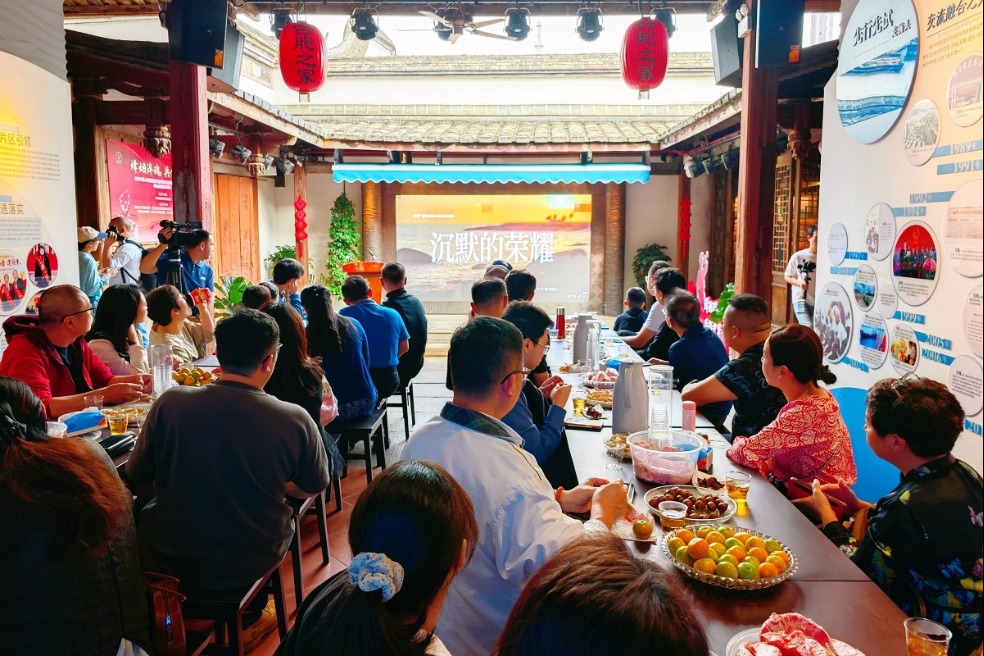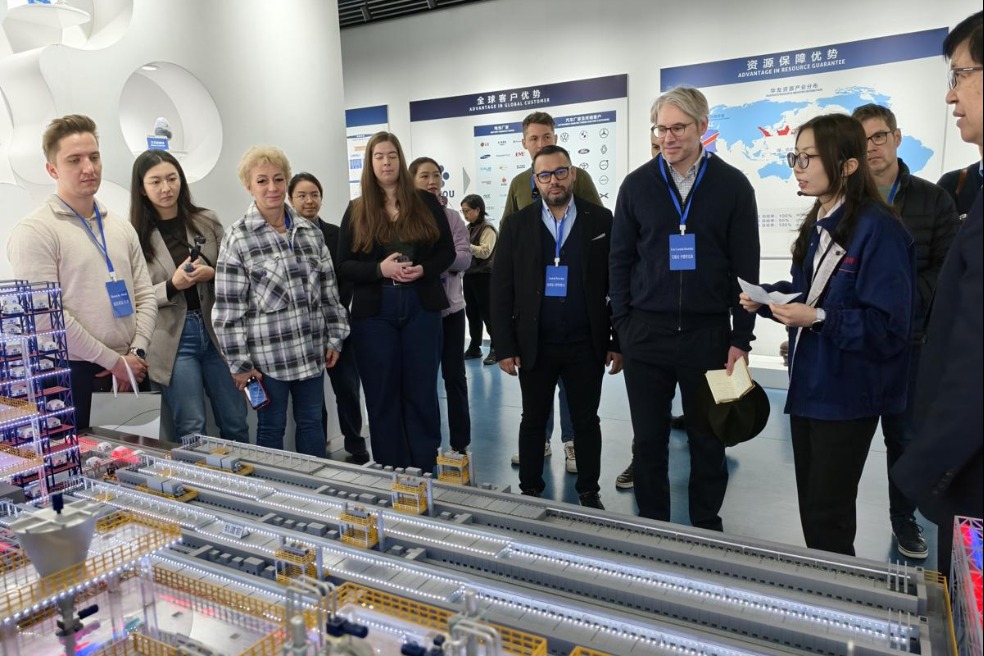It's time for the 'gold' and 'silver'


The Greater Bay Area sees jobs galore as businesses get back on track with COVID-19 in retreat on the mainland. Zhou Mo reports from Shenzhen.
Nobody craving a job is just sitting back and relaxing at this time, during the months that job seekers on the Chinese mainland consider "Golden March" and "Silver April".
It's the traditional peak season for both employers and employees — almost immediately after Spring Festival — as tens of millions of migrant workers flock back to the cities after celebrating the Year of the Ox in their hometowns.
This time, it's a world of difference compared with the spring of last year, when COVID-19 began its rampage, forcing millions of people to be confined to their homes, and businesses came to an abrupt halt. But with the pandemic stopped in its tracks this year, the mainland job market now is a hive of activity, with enterprises and job seekers adopting a positive outlook.
According to a survey by online job-hunting platform Liepin, the number of new jobs up for grabs had gone up nearly 270 percent in the first week following this year's Spring Festival holiday, compared with the same period in 2020. The number of active job hunters soared by up to 70 percent year-on-year.
More than 80 percent of the companies surveyed are convinced they can get the right people this year, citing the pandemic's retreat, and the steady economic recovery on the mainland as the key factors. Almost half of them said they'll expand their recruitment drives.
The atmosphere is particularly vibrant in the Guangdong-Hong Kong-Macao Greater Bay Area, where tens of thousands of small and medium-sized businesses are located. Many of them deal with foreign trade and have seen their operations grow remarkably since last year as overseas orders surged amid the public health crisis.
The Greater Bay Area is the cream of the crop, recording the highest growth in the number of new jobs on offer across the country — up by 375 percent for the first week after the Spring Festival break — compared with the same period a year ago.
Having lain idle at home for more than a year, Tian Chunhua said it's time to get back to work. The 32-year-old quit his job as a risk management worker at a Shenzhen bank in late 2019. He had to fork out about 20,000 yuan (US$3,060) to join a coding training class, hoping to get a better paying job with the new knowledge he acquired.
But luck wasn't with him — COVID-19 pummeled the country, forcing companies to postpone or shut down their recruitment plans. Tian realized that meeting his expectations would be immensely difficult. He had no choice but to wait it out.
"As the pandemic has eased and the mainland economy is getting back on track, I believe many companies will expand this year, with a number of good opportunities," he said.
Job market sees reviving
In its latest government work report, Guangdong province set a target of creating 1.1 million new jobs in the urban areas this year. Last year, the South China province topped the national list in terms of the number of new urban jobs created, 1.34 million.
Guangdong unveiled a host of measures last month to promote employment this year, including alleviating burdens of enterprises and stabilizing jobs, encouraging entrepreneurship, offering support for those who find it hard to get employed, and improving workers' technical skills.
In Shenzhen — the region's technological pivot — the resilience of its job market can be seen from one of the city's major on-site job fairs this year. The event had to be put on hold in 2020 because of the pandemic; it resumed last month.
On the first day of this year's fair, held at Shenzhen Talent Service Center on March 15, about 1,400 jobs were on offer from 60 enterprises, covering such fields as intelligent manufacturing, finance, information technology and trade.
"Some of the employers had asked us before the Spring Festival holiday when we could resume the fair as they need professionals and the event will be where they can reach out to them. Job hunters are also very active. Even before the fair started, they would come to us for details," said Lu Juan, director of recruitment and outsourcing s at the Shenzhen Talent Service Center.
"To meet the huge demand for jobs, along with the need for COVID-19 prevention and control, we have a new O2O (online to offline) model this year. Job seekers who aren't able to come to the fair can send their resumes online, and employers can then arrange video interviews with them through our platform," she said.
The Shenzhen job fair, which opens two days weekly, will last until the second half of this year.
A human resource manager of Biel Crystal Manufactory (Huizhou), which is taking part in the fair, said talent is in great demand. "Right now, we've more than 100 jobs available."
The company supplies cover glasses for Apple, Samsung and other mobile-phone makers.
"For certain reasons, some of our employees left before the Chinese New Year. As we're starting new businesses, we need a much bigger workforce," the manager said. He added that the pandemic's impact on his company's export business has eased and they now have sufficient overseas orders on hand.
Other mainland cities in the Greater Bay Area are also performing well in the job market. According to the latest data from online recruitment platform Zhaopin, the number of jobs vacancies in Zhuhai and Guangzhou rose by 5.5 percent and 4.7 percent respectively, in the week from March 18, compared with the previous week.
The two cities rank among the top five mainland cities in terms of the week-on-week increase in job vacancies. The figures also show that Zhuhai and Dongguan are among the best-performing mainland cities in wage increases in this year's spring recruitment season, rising by more than 5 percent year-on-year.
SARs' talent is welcomed
The Greater Bay Area's sprightly job market has not only helped mainland job seekers, but also provided a vital platform for those from the Hong Kong and Macao special administrative regions. As integration between the mainland and the two SARs deepens, many mainland employers in the Greater Bay Area are offering jobs that target young people from the two cities.
At a job fair held earlier this month in Guangzhou, more than 3,000 jobs from nearly 100 employers were open to graduates from Hong Kong, Macao and Taiwan. The posts covered a wide range of areas, including the pharmaceutical, finance, information and technology, and media sectors.
"We've set up branches in Hong Kong and Zhuhai's Hengqin New Area and, therefore, there's great demand for Hong Kong and Macao talent," said Guan Ziwei, a human resources manager at Guangzhou Pharmaceuticals Co.
"We've teamed up with some universities in Hong Kong and Macao. Every year, there are students coming to us for internship. Graduates from the two cities have unique advantages as they possess a broader international vision and are more proficient in foreign languages," he said.
The Qianhai Shenzhen-Hong Kong cooperation zone in Shenzhen recently arranged for about 50 enterprises to recruit Hong Kong, Macao and Taiwan graduates from six mainland universities, including Shenzhen University, Sun Yat-sen University and Jinan University, offering 500 jobs and 347 internships. More than 310 graduates from the three territories applied.
Besides enterprises, local governments in mainland cities in the Greater Bay Area are opening their doors to Hong Kong and Macao residents.
Under this year's Guangdong provincial civil servant recruitment plan, five posts in Shenzhen and Dongguan are open to residents from Hong Kong and Macao. For the first time last year, Shenzhen offered five posts to Hong Kong and Macao residents in its municipal civil servant recruitment program, which attracted 446 applicants.
- Shanghai's cross-border e-commerce pilot zone gains from CIIE's spillover effect
- Pioneering deep-sea mission completed
- Foreigners back Xizang's boarding school system
- Compatriots from both sides of Taiwan Strait oppose external interference
- Ex-deputy GM of key state-owned enterprise expelled from CPC for corruption
- Legislators push stronger protections for disabled





































